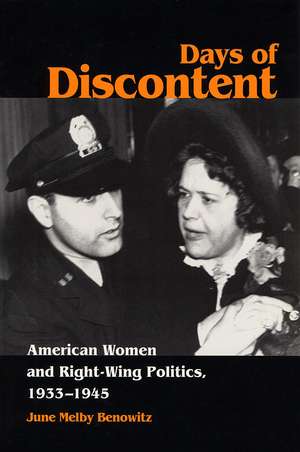Days of Discontent: American Women and Right-Wing Politics, 1933-1945
Autor June Melby Benowitzen Limba Engleză Hardback – 28 feb 2002
Holding fast to traditional values in the face of unprecedented economic hardship, nearly a million American women joined right-wing organizations during the Great Depression and World War II. Days of Discontent provides a new perspective for understanding why the far right appealed to these women, whose political self-awareness grew with the tumultuous times.
Influenced by the conventional image of women as mothers and nurturers, many women viewed the right-wing movement as a way to protect and maintain American morality. The radical right leaders, such as Elizabeth Dilling and Grace Wick, held ideas in common with European fascists but based their politics on a uniquely American mixture of nativism, anticommunism, anti-Semitism, and racism. Benowitz's insight into their motivations sheds new light on the interaction between women's daily lives and national politics.
Influenced by the conventional image of women as mothers and nurturers, many women viewed the right-wing movement as a way to protect and maintain American morality. The radical right leaders, such as Elizabeth Dilling and Grace Wick, held ideas in common with European fascists but based their politics on a uniquely American mixture of nativism, anticommunism, anti-Semitism, and racism. Benowitz's insight into their motivations sheds new light on the interaction between women's daily lives and national politics.
Preț: 381.98 lei
Nou
Puncte Express: 573
Preț estimativ în valută:
73.09€ • 76.51$ • 60.84£
73.09€ • 76.51$ • 60.84£
Carte tipărită la comandă
Livrare economică 31 martie-14 aprilie
Preluare comenzi: 021 569.72.76
Specificații
ISBN-13: 9780875802947
ISBN-10: 087580294X
Pagini: 240
Dimensiuni: 152 x 229 x 23 mm
Greutate: 0.54 kg
Ediția:1
Editura: Northern Illinois University Press
Colecția Northern Illinois University Press
ISBN-10: 087580294X
Pagini: 240
Dimensiuni: 152 x 229 x 23 mm
Greutate: 0.54 kg
Ediția:1
Editura: Northern Illinois University Press
Colecția Northern Illinois University Press
Recenzii
"A must-read for scholars of twentieth-century American politics and women."—History
"A remarkable compilation of research and analysis."—NWSA Journal
"This book succeeds in assembling a large body of information about heretofore obscure right-wing women activists."—Journal of Social History
"A remarkable compilation of research and analysis."—NWSA Journal
"This book succeeds in assembling a large body of information about heretofore obscure right-wing women activists."—Journal of Social History
Notă biografică
June Melby Benowitz received her Ph.D. from the University of Texas and is the author of the Encyclopedia of American Women and Religion. She currently resides with her husband, Elliot, in Sarasota, Florida.
Cuprins
Table of Contents
Acknowledgements
Introduction
1. Mobilizing
2. Elizabeth Dilling, Right-Wing Evangelist
3. Grace Wick, Disillusioned Democrat
4. "This Sphere Is Woman's Home"
5. "It's Up to the Women"
6. Right-Wing Women Leaders
7. Political Action during the War Years
8. "I Enlisted in this Fight for Life"
Conclusion
Notes
Bibliography
Index
Introduction
1. Mobilizing
2. Elizabeth Dilling, Right-Wing Evangelist
3. Grace Wick, Disillusioned Democrat
4. "This Sphere Is Woman's Home"
5. "It's Up to the Women"
6. Right-Wing Women Leaders
7. Political Action during the War Years
8. "I Enlisted in this Fight for Life"
Conclusion
Notes
Bibliography
Index
Descriere
Holding fast to traditional values in the face of unprecedented economic hardship, nearly a million American women joined right-wing organizations during the Great Depression and World War II. Days of Discontent provides a new perspective for understanding why the far right appealed to these women, whose political self-awareness grew with the tumultuous times.
Influenced by the conventional image of women as mothers and nurturers, many women viewed the right-wing movement as a way to protect and maintain American morality. The radical right leaders, such as Elizabeth Dilling and Grace Wick, held ideas in common with European fascists but based their politics on a uniquely American mixture of nativism, anticommunism, anti-Semitism, and racism. Benowitz's insight into their motivations sheds new light on the interaction between women's daily lives and national politics.
Influenced by the conventional image of women as mothers and nurturers, many women viewed the right-wing movement as a way to protect and maintain American morality. The radical right leaders, such as Elizabeth Dilling and Grace Wick, held ideas in common with European fascists but based their politics on a uniquely American mixture of nativism, anticommunism, anti-Semitism, and racism. Benowitz's insight into their motivations sheds new light on the interaction between women's daily lives and national politics.
